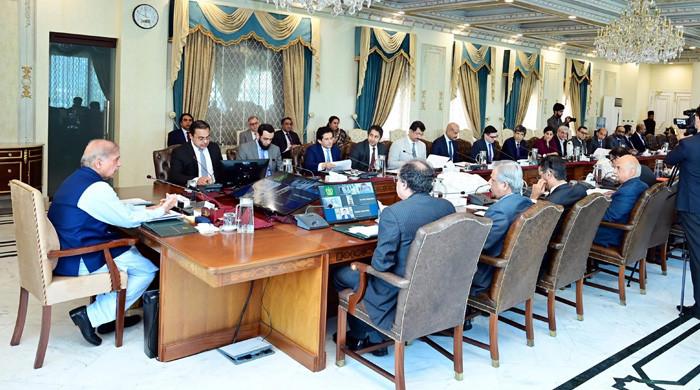Govt orders increasing appellate tribunals for tax cases to 100


- PM emphasises zero tolerance for delays in sales tax refund.
- Orders implementation of unified sales tax system by October.
- AEES will be rolled out at four ports in Karachi, major airports.
Prime Minister Shehbaz Sharif has issued directives to increase the number of appellate tribunals to 100 to expedite the resolution of tax cases.
Chairing a review meeting on reforms and digitisation in the Federal Board of Revenue (FBR) on Thursday, the premier also directed an increase in the number of appellate tribunals for customs cases and the creation of a dashboard to evaluate the performance of Tax Appellate Tribunals.
He said that tax refund fraud amounting to Rs800 billion was uncovered in the past four months, and emphasised further improvements to the tax refund system.
The prime minister also added that increasing revenue was achievable through reforms in the FBR. He lamented the unfortunate and unnecessary delays in many of the FBR’s reform projects.
PM Shehbaz emphasised zero tolerance for delays in sales tax refund payments and instructed the immediate formulation of a strategy to recover unlawfully issued refunds.
He directed the complete digitisation of the FBR’s Fraud Detection and Investigation Department and the development of a strategy to centralise all ongoing reform projects within the FBR.
The prime minister instructed the relevant authorities to employ the latest technology and the best personnel for the digitisation of the FBR.
He ordered the implementation of a unified sales tax system for all taxpayers by October 2024.
PM Shehbaz was briefed that a unified sales tax return system, successfully implemented by the telecom sector, was being introduced for taxpayer convenience.
The revenue board aimed to integrate with revenue authorities across the country through a unified sales tax platform, it was told.
He assured timely funding for upgrading the customs system and directed the FBR to devise a strategy for designing and implementing the new software system.
The premier was also informed about the reforms in Inland Revenue and Customs, along with the progress achieved in digitising the FBR in the last eight weeks.
He was also apprised that McKinsey, a globally recognised consultant, was overseeing the digitisation process of the FBR, and positive outcomes from this initiative have begun to surface.
The PM was informed that there were 83,579 tax-related cases amounting to Rs 3.2 trillion pending in various courts and tribunals.
It was conveyed in the forum that during the current government’s tenure, several initiatives have been undertaken to handle tax cases.
In the past four months alone, courts have settled 63 cases amounting to approximately Rs44 billion.
The prime minister was briefed that modern technology has identified 4.9 million individuals capable of paying taxes.
He instructed to prioritise bringing wealthy individuals and capitalists into the tax net, ensuring no additional burden on the poor.
During the briefing, the PM was informed that since April 1, 2024, 150,000 retailers have been registered using the FBR’s trader-friendly mobile phone application.
The premier instructed to maintain consultations with retailers to enhance the effectiveness of this system.
The prime minister also instructed to prepare proposals for reforming the Pakistan Revenue Automation Authority (PRAL).
The PM was informed that the implementation of the Integrated Transit Trade Management System (ITTMS) project was scheduled to commence in October 2024.
Under the ITTMS initiative, international standard one-window facilitation centres were being set up at the Pakistan-Afghanistan borders of Torkham and Chaman.
The development of the Customs Automated Entry-Exit System (AEES) has commenced.
Subsequently, AEES will utilise cutting-edge scanning technology and integrate with the web-based — One Customs and Pakistan Single Window — platforms.
The forum was informed that initially, AEES will be rolled out at four ports in Karachi and airports in Karachi, Multan, and Peshawar.
The prime minister directed the implementation of the AEES system at Gwadar Port as well.
The meeting was attended by Federal Minister for Economic Affairs Ahad Khan Cheema, Federal Minister for Finance and Revenue Muhammad Aurangzeb, Federal Minister for Law and Justice Azam Nazeer Tarar, Federal Minister for Information and Broadcasting Attaullah Tarar, Minister of State for Finance Ali Parvaiz Malik, Deputy Chairman Planning Commission Jehanzeb, Khan, Prime Minister’s Coordinator Rana Ihsan Afzal, FBR Chairman Malik Amjad Zubair Tiwana, and other senior government officials.
Source link



